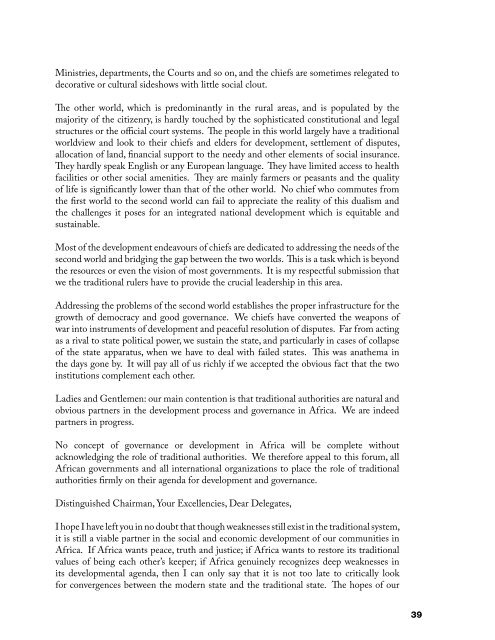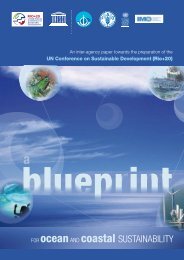Relevance of - United Nations Economic Commission for Africa
Relevance of - United Nations Economic Commission for Africa
Relevance of - United Nations Economic Commission for Africa
You also want an ePaper? Increase the reach of your titles
YUMPU automatically turns print PDFs into web optimized ePapers that Google loves.
Ministries, departments, the Courts and so on, and the chiefs are sometimes relegated to<br />
decorative or cultural sideshows with little social clout.<br />
The other world, which is predominantly in the rural areas, and is populated by the<br />
majority <strong>of</strong> the citizenry, is hardly touched by the sophisticated constitutional and legal<br />
structures or the <strong>of</strong>ficial court systems. The people in this world largely have a traditional<br />
worldview and look to their chiefs and elders <strong>for</strong> development, settlement <strong>of</strong> disputes,<br />
allocation <strong>of</strong> land, financial support to the needy and other elements <strong>of</strong> social insurance.<br />
They hardly speak English or any European language. They have limited access to health<br />
facilities or other social amenities. They are mainly farmers or peasants and the quality<br />
<strong>of</strong> life is significantly lower than that <strong>of</strong> the other world. No chief who commutes from<br />
the first world to the second world can fail to appreciate the reality <strong>of</strong> this dualism and<br />
the challenges it poses <strong>for</strong> an integrated national development which is equitable and<br />
sustainable.<br />
Most <strong>of</strong> the development endeavours <strong>of</strong> chiefs are dedicated to addressing the needs <strong>of</strong> the<br />
second world and bridging the gap between the two worlds. This is a task which is beyond<br />
the resources or even the vision <strong>of</strong> most governments. It is my respectful submission that<br />
we the traditional rulers have to provide the crucial leadership in this area.<br />
Addressing the problems <strong>of</strong> the second world establishes the proper infrastructure <strong>for</strong> the<br />
growth <strong>of</strong> democracy and good governance. We chiefs have converted the weapons <strong>of</strong><br />
war into instruments <strong>of</strong> development and peaceful resolution <strong>of</strong> disputes. Far from acting<br />
as a rival to state political power, we sustain the state, and particularly in cases <strong>of</strong> collapse<br />
<strong>of</strong> the state apparatus, when we have to deal with failed states. This was anathema in<br />
the days gone by. It will pay all <strong>of</strong> us richly if we accepted the obvious fact that the two<br />
institutions complement each other.<br />
Ladies and Gentlemen: our main contention is that traditional authorities are natural and<br />
obvious partners in the development process and governance in <strong>Africa</strong>. We are indeed<br />
partners in progress.<br />
No concept <strong>of</strong> governance or development in <strong>Africa</strong> will be complete without<br />
acknowledging the role <strong>of</strong> traditional authorities. We there<strong>for</strong>e appeal to this <strong>for</strong>um, all<br />
<strong>Africa</strong>n governments and all international organizations to place the role <strong>of</strong> traditional<br />
authorities firmly on their agenda <strong>for</strong> development and governance.<br />
Distinguished Chairman, Your Excellencies, Dear Delegates,<br />
I hope I have left you in no doubt that though weaknesses still exist in the traditional system,<br />
it is still a viable partner in the social and economic development <strong>of</strong> our communities in<br />
<strong>Africa</strong>. If <strong>Africa</strong> wants peace, truth and justice; if <strong>Africa</strong> wants to restore its traditional<br />
values <strong>of</strong> being each other’s keeper; if <strong>Africa</strong> genuinely recognizes deep weaknesses in<br />
its developmental agenda, then I can only say that it is not too late to critically look<br />
<strong>for</strong> convergences between the modern state and the traditional state. The hopes <strong>of</strong> our<br />
39
















